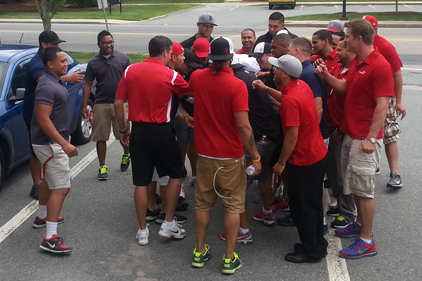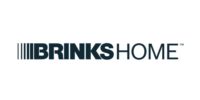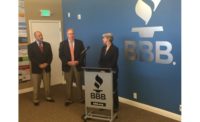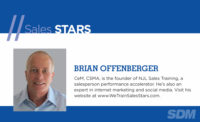
|
| Tim Whall joins the Boston 1 to 1 team for a huddle before going out to make home visits |
This summer, Protection 1’s CEO, Tim Whall, as well as many members of the company’s leadership, are going out to learn a bit more about the summer sales model from first-hand experience. The company’s new sales initiative, which it calls 1 to 1, has a lot of features of traditional door-to-door sales: the company is hiring highly motivated, young sales reps to go out and knock on doors across the country and tell people about P1’s security and home automation systems. But it is the different roads the company has taken to the old model that makes this a revolutionary approach.
P1’s approach to 1 to 1 sales is all about coming to stay: establishing good relationships with the community by complying with local licensing rules, offering sales reps a 12-month, rather than a 4 ½ -month position, and backing all of their efforts up with a thorough quality control team.
The door-to-door model was limited, prior to P1 coming into the space, by an in-and-out philosophy, Whall said. “Right out of the gate, we don’t like that idea. For us it’s the brick-and-mortar piece.
"Hey, you’re going to come into one of my 74 towns and sell systems. So you’re going to add density for my account base, which is good for me. Now it’s good for you — the rep — because when they ask ‘Where’s your office?’ you tell them you’re the local kids in town and we’ve been here 25 years. So we’re strengthening the guy on the tour’s story. Usually, they’d have to skirt the question ‘where are you located?’ because they don’t want to say 'we’re all the way out in Utah and that’s the only office we have.'”
Whall added, “[Door-to-door has] been a traditional model where the folks up in Utah have predominantly recruited the kids out of the colleges and deployed them for a summer. What got us excited wasn’t the kids coming out of college, it was the guys who found they were making good money and this is a sales career.”
Whall has enjoyed the opportunity to talk career-building with reps he’s accompanied on sales calls this summer. So far, he has visited teams in Virginia Beach, Raleigh, N.C., Chicago, Boston, and Oklahoma City. “I’m having fun,” Whall said. “I’m meeting new guys and gals. I’m asking how long they’ve done it, how they approach the door... Obviously, what I like talking about is making this a career for them. That’s the part that’s got most of them excited. It’s no more, ‘you can only work for 4 ½ months out of the year and try to make the money you need. ’ We want them to work at the branch they want to work in a 12-month program and do what they like doing.”
In the long term, Whall's goal is to give these sales professionals year-round opportunities that allow them — and their families — to grow. "In my opinion, the most difficult sale is cold-calling residential selling. It’s a difficult sale and these kids are relentless and they work hard and they don’t get weighed down by the negativism or the rejection. They see it as one door closer to a ‘yes.’ Well, those are sales professionals. We feel we can teach them the commercial business. And again, young married couples with kids, maybe you don’t want to work 1pm to 9pm Monday through Friday and then a 12-hour day on Saturdays. Maybe you want to go into more commercial hours. Or maybe you want to go into integrated sales if you have a little more technical aptitude. Perhaps you just want to get into management. We feel we have a lot of career-growth opportunities that they didn’t have available to them before."
On the other hand, going on the road has allowed the company to get closer to its customers in addition to its sales reps. Jamie Haenggi, chief marketing officer for P1, shared, “It’s a really eye-opening experience to be out there and quite frankly it opens your eyes to understand the consumer aspect. As a marketer, you get to be there front and center with the customer and understand their thought process, understand the pitch. You understand how [reps] use the tools, what’s useful and what’s not useful. Often in marketing, you don’t get close-ups of the sales force or the customer to understand what works. We came back with a lot of great ideas.”
Whall noted that as his first time “door-knocking,” he was taken aback by the widely varying attitudes and personalities one can encounter, from openly aggressive and paranoid to considerate and open, and the sales reps’ abilities to be prepared for it all.
“The thing that really resonated with me with going out there with them is how hard they work. Their work ethic is admirable. Their stamina — they’ll work for nine-ten hours straight and just take a few breaks for water. When I’m in the tour and someone is rude to me I’m like, ‘hey hey, that’s wasn’t all necessary.’ They’re like, ‘don’t worry about that, we’ll hit another door.’ Negative energy doesn’t bother them. They’ve said, ‘Tim, somebody that we knock on is going to be thinking about security today. We just have to find out who it is.’”
Since February, the company had deployed 39 teams throughout the country, a process that took more than a little time and effort as P1 worked on proper licensing and training for its expanded sales force.
Whall admitted licensing was probably the biggest change for the company with this new sales channel. “We’re licensed to do business in all the towns and states we’re required to. And we’re very used to that. We weren’t as used to all the peddler’s licenses.” He noted that rules and requirements to obtain and maintain these licenses vary widely from state to state and even town to town. In the town of Naperville, near Chicago, after going there and applying for a license, all reps must attend monthly meeting to be able to renew their licenses. In addition, all reps knocking doors in that town must wear an orange vest.
Making sure all these idiosyncrasies are accounted for and all requirements met is the job of the corporate licensing team out of Lawrence, Kan. “When we brought this new sales channel in, we had to add six more people to that department because there was so much work to do,” Whall said. “And that’s the group that actually oks that you can sell. A manager can’t say ‘Bill is ready to go.’ It has to come from corporate licensing to you as a rep in that town. Once they get their first license, the team activates that rep in [that town]. That doesn’t mean they're active in [the next town]. Any authorities come up on any of our folks, we have to be able to say we’re absolutely in our right to be here.”
Certainly, the bad reputation some summer sales model companies have earned was no small concern for Whall as the company prepared to enter the space. “Two things were important for us: We spent a lot of time training in terms of what we expect them to do,” Whall said. “The analogy we used is we have a billion dollar brand; so think about a billion dollar yacht that’s going to ferry $500 packages across Lake Michigan this summer. If a few $500 packages fall, we’re fine. If we crash the yacht, that’s a problem.”
The company is highly sensitive to any issues that could impact the brand. During training, different issues that could get the company in trouble are carefully explored. And then there are things that reps have little control on, such a customer that’s strongly bothered by someone knocking on their door and may adamantly complain or say they felt threatened. In those cases, reps can call a 1-800 support number to have an operator speak to the person, to confirm that the rep is an employee in good standing, or lead that person to the website to check up on the rep and diffuse the situation before it goes anywhere.
The second important thing Whall mentioned are quality control checks. When someone agrees to buy a system, before the rep goes any further into the paperwork, he or she will call the quality control group so they can talk to the customer and ask questions about the customer’s satisfaction with the sales rep and their professionalism. They will then go through the system they’re agreeing to buy point by point, to make sure what the rep has input into the system and will sell matches the customer’s expectations and needs. They may also ask, 'did he explain to you that Protection 1 is affiliated with no other company in this business? Do you have a current provider? If yes, why are you switching from that provider? Do you realize you may have a contract or a balance with that provider? Have you verified that you don’t and that you can make this switch? Do you realize you are signing a contract for a monthly fee and the reason there is little money up-front is because you are signing to pay back the fee over the months of the contract?' That call is recorded for future reference and the rep can move forward. When the technician arrives to do the installation, the first thing he does is call the 1-800 number. And again the quality control team will check that the customer understands the terms of the contract and exactly what will be installed into their home. The last step is a follow-up call from the quality control team to make sure the installation went smoothly and the customer is satisfied.
“We’re coaching the reps up-front on the right way to sell a system and to tell the P1 story, which is no different than what we do in each of our sales channels. And then we put the quality control measurements in the back-end, just because we’ve read enough about how these things go sideways and we didn’t want any part of that.” Whall added that what’s important to remember is, “I trust everybody but I have to verify.”
Behind the new channel for P1 is a robust sales engine the company built up with one important addition it acquired this past February. At that time, P1 purchased several assets from Pinnacle Security as it was being sold off. The assets consisted primarily of the back-end IT system that enabled the company’s summer sales model. With the integration of these IT assets, P1 announced it would create a new sales channel to focus on residential, one-to-one selling.
Whall explained, “When we looked at sales, we thought we had pretty robust IT capabilities. But were so impressed by [Pinnacle’s] stuff. A quick example: they have something called a Dashboard. Every day I can click on it and see the pictures and faces of the guys, what they sold yesterday and the quality of those sales, as well as how each office did against each other. I can click on a fella’s name— here’s Jeff, he had the highest quality of sales yesterday. I can click on his face, choose text or email, and just like that I’m typing ‘Jeff, great day, love the effort. Thanks so much.’ In seconds I’ve communicated to him. But more than that, they have the analytics of everything we did and sold yesterday. What kind of credit scores did we bring? Did we charge up-front money? What equipment did we sell the customer? Are they buying the equipment that will give us a higher attach rate? Are they buying the home automation-type stuff or are they just buying remote access?
“We’re bringing all that to P1. In a sense it’s a bit of a reverse integration. Our sales teams are now getting used to the mechanics and reporting capabilities that we purchased. And we got some great talent that came out of Utah.”



